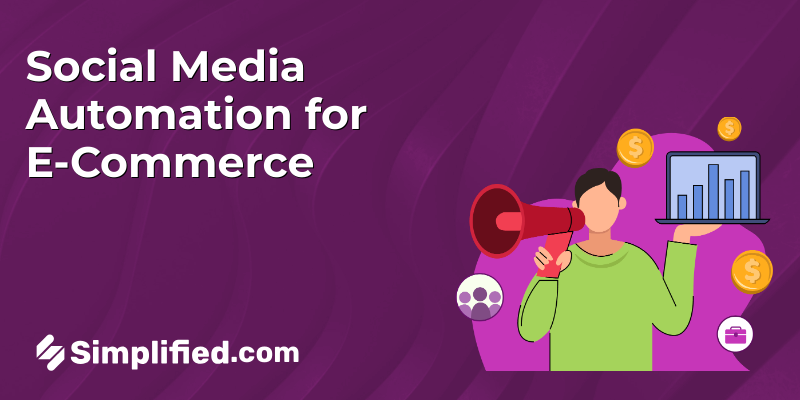
Imagine managing your e-commerce business online without the constant task of handling social media. Instead, you could focus on growing your brand while automation tools take care of your social media presence. In today’s fast-paced digital world, this is not only possible, it’s necessary. With the right automation tools, you can schedule posts, interact with your audience, and track results without having to be hands-on at all times. But what strategies work best, and which tools should you use to stay ahead? Let’s explore how social media automation can help your e-commerce business, using effective tools and techniques to grow your online presence with less effort.
Utilizing Social Media Automation for E-Commerce
Social media automation helps e-commerce businesses maintain an active online presence without dedicating excessive time to repetitive tasks. By automating key activities like scheduling post and performance tracking, businesses can reach their target audience effectively while focusing on growth. Automation also allows for better timing and consistency, helping you keep your brand visible and responsive.
Bonus: Top E-commerce Analytics Tools for Maximized Success
Essential E-Commerce Social Media Tools
Here are eight effective tools that support various aspects of social media automation for e-commerce businesses:
- Post Scheduling Tool: Automates content posting across platforms, ensuring your posts reach audiences when they’re most active. Scheduling tools often come with features to plan posts weeks or even months in advance.
- Content Creation Tool: Simplifies the process of creating visually engaging content, offering design templates and customization options to maintain a consistent look and feel.
- Social Media Management Tool: Manages multiple social media accounts from a single dashboard, enabling you to track engagements, respond to comments, and manage messages.
- Analytics and Insights Tool: Tracks performance metrics like engagement rates, reach, and impressions. This tool helps businesses understand which strategies resonate most with their audience.
- Customer Engagement Tool: Automates responses to common customer inquiries and interactions, providing immediate support and engagement.
- Ad Management Tool: Allows you to automate ad placements across social media channels, targeting specific demographics based on user behavior and interaction with your brand.
- Influencer Collaboration Tool: Manages relationships with influencers by helping you schedule posts, track interactions, and monitor engagement. This tool is ideal for e-commerce businesses aiming to extend their reach.
- Social Listening Tool: Monitors brand mentions, relevant trends, and competitor activity, giving you insights into what your audience is talking about. This helps e-commerce businesses stay updated on industry trends and customer needs.
Bonus: How To Use The AIDA Model For Effective E-Commerce Marketing
Best Social Media Automation Tools For E-Commerce in Market
Here are eight social media automation tools ideal for e-commerce businesses, each offering features that simplify managing your online presence:
- Simplified: Simplified provides a platform for e-commerce brands to manage social media. It includes a content creation tool with customizable templates, stock photos, and design elements. The scheduling tool allows you to plan and automate posts across multiple platforms.
- Buffer: Buffer allows you to queue posts across multiple platforms and analyze performance metrics to refine your social media strategy.
- Hootsuite: A comprehensive social media management tool that enables e-commerce brands to schedule posts, monitor social activity, and interact with followers from one platform.
- Canva: Though primarily a design tool, Canva’s content scheduling features help businesses create visually appealing posts and directly schedule them to social media platforms.
- Sprout Social: Sprout Social Combines social media management with detailed analytics. It allows businesses to schedule posts, respond to followers, and gain insights into audience engagement.
- ManyChat: ManyChat automates customer interactions via chatbots, enabling e-commerce brands to provide instant responses to common inquiries onsocial platforms.
Bonus: Implementing Workflow Automation For Business Expansion
Automating E-Commerce Marketing Campaigns
Automating marketing tasks helps e-commerce businesses reach customers more effectively. Platforms like Mailchimp enable businesses to run automated campaigns, sending messages based on customer actions.
For instance, abandoned cart reminders can help recover lost sales, and automated ads can target specific demographics to increase conversions. By automating these tasks, businesses can maintain consistent customer engagement.
Step-by-Step Guide to Implementing Social Media Automation
To start using social media automation in your e-commerce business, follow these simple steps:
- Identify Repetitive Tasks: Find tasks that take up a lot of time, such as posting or responding to messages, and decide which can be automated.
- Choose the Right Tools: Pick automation tools that meet your needs, such as Hootsuite for scheduling and Chatbot for customer interaction.
- Create a Content Calendar: Plan your content ahead of time so you can post consistently and stay relevant.
- Check Analytics Regularly: Use the insights from your automation tools to see how your content is performing and make adjustments when necessary.
These steps will help integrate automation into your workflow and free up time for more strategic tasks.
Bonus: Top Workflow Automation Tools for Business Operations
Benefits of Social Media Automation for E-Commerce
Social media automation offers several benefits for e-commerce businesses:
- Maintain Consistency: Automation helps keep a steady online presence, which is important for building trust with customers.
- Schedule Content at the Right Time: Automation tools allow you to post content when your audience is most likely to see it.
- Get Valuable Insights: These tools give you data on how your content is performing, which helps you improve your marketing strategies.
- Save Time and Resources: By automating tasks, your team can focus on more important work, improving efficiency.
By using automation, e-commerce businesses can improve their marketing and achieve better results.
Conclusion
Social media automation is invaluable for e-commerce businesses looking to save time while staying connected with their audience. By using automation tools effectively, brands can handle routine tasks with ease and focus on more strategic areas of growth. Whether it’s scheduling posts, engaging with customers, or tracking performance, social media automation helps simplify complex tasks and strengthen your online presence.

























